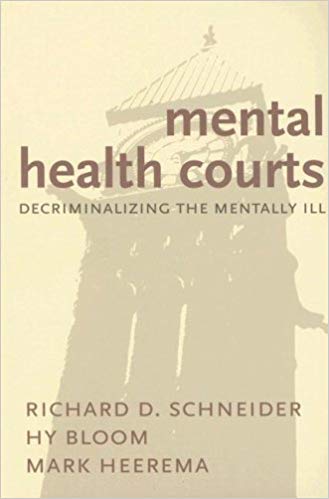Mental health courts began as grassroots initiatives in the mid-1990s. Early versions found inspiration from the success of drug courts--an emerging brand of court dedicated to accused with substance addictions. On a very basic level, drug courts operate by offering accused a simple option: avoid serving a sentence for your drug-related offence by completing a drug-treatment program.
One of the first known programs to tackle the problem of mentally disordered accused in the criminal justice system was created in Toronto. The "Diversion of Mentally Disordered Accused" became a program which was part of the Crown Policy Manual in 1994. The success of these specialty courts, along with a growing awareness that the traditional criminal justice system was failing individuals with mental disorders, combined to legitimize the emergence of mental health courts.
In writing this book, the authors have sought to assist two groups of professionals primarily involved with these courts, namely, mental health care service providers and the various criminal justice professionals.
Part I of this book is an overview of the historical and theoretical foundations underlying the mental health court movement. It outlines the various factors which precipitated the emergence of these courts. Part II offers a thorough description of a typical mental health court in operation. In addition to describing the role of each mental health court team member, it goes on to provide guidance to those seeking to establish a mental health court. Part III analyzes the successes and failures of these courts and ends with a critical look at the long-term desirability of mental health courts.
چکیده فارسی
دادگاه های سلامت روان به عنوان ابتکارات مردمی در اواسط دهه 1990 شروع به کار کردند. نسخههای اولیه از موفقیت دادگاههای مواد مخدر الهام میگرفتند - یک برند دادگاه نوظهور که به متهمان اعتیاد به مواد اختصاص داده شده است. در سطح بسیار ابتدایی، دادگاههای مواد مخدر با ارائه یک گزینه ساده به متهم عمل میکنند: با تکمیل یک برنامه معالجه مواد مخدر، از اجرای مجازات برای جرم مرتبط با مواد مخدر خود اجتناب کنید.
یکی از اولین برنامه های شناخته شده برای مقابله با مشکل متهمان اختلال روانی در سیستم عدالت کیفری در تورنتو ایجاد شد. "انحراف متهمان مبتلا به اختلالات روانی" به برنامه ای تبدیل شد که در سال 1994 بخشی از کتابچه راهنمای خط مشی تاج و تخت بود. موفقیت این دادگاه های تخصصی، همراه با آگاهی روزافزون مبنی بر اینکه سیستم عدالت کیفری سنتی در حال ناکام ماندن افراد مبتلا به اختلالات روانی بود، در ترکیب برای مشروعیت بخشیدن به آنها. ظهور دادگاه های سلامت روان.
در نوشتن این کتاب، نویسندگان به دنبال کمک به دو گروه از متخصصان که عمدتاً با این دادگاهها درگیر هستند، یعنی ارائهدهندگان خدمات مراقبتهای بهداشت روان و متخصصان مختلف عدالت کیفری، بودهاند.
بخش اول این کتاب مروری بر مبانی تاریخی و نظری نهضت دادگاه سلامت روان است. این به تشریح عوامل مختلفی میپردازد که باعث ظهور این دادگاهها شدهاند. بخش دوم شرح کاملی از یک دادگاه سلامت روان معمولی در حال کار ارائه می دهد. علاوه بر تشریح نقش هر یک از اعضای تیم دادگاه سلامت روان، در ادامه به کسانی که به دنبال ایجاد دادگاه سلامت روان هستند راهنمایی می کند. بخش سوم موفقیت ها و شکست های این دادگاه ها را تحلیل می کند و با نگاهی انتقادی به مطلوبیت بلندمدت دادگاه های سلامت روان به پایان می رسد.
ادامه ...
بستن ...
Ebook details:
عنوان: Mental Health Courts: Decriminalizing the Mentally Ill
نویسنده: Hon Richard D Schneider, Hy Bloom, Mark Heerema
ناشر: Irwin Law (January 10, 2007)
زبان: English
شابک: 1552211207, 978-1552211205
حجم: 3 Mb
فرمت: True Pdf
ادامه ...
بستن ...










